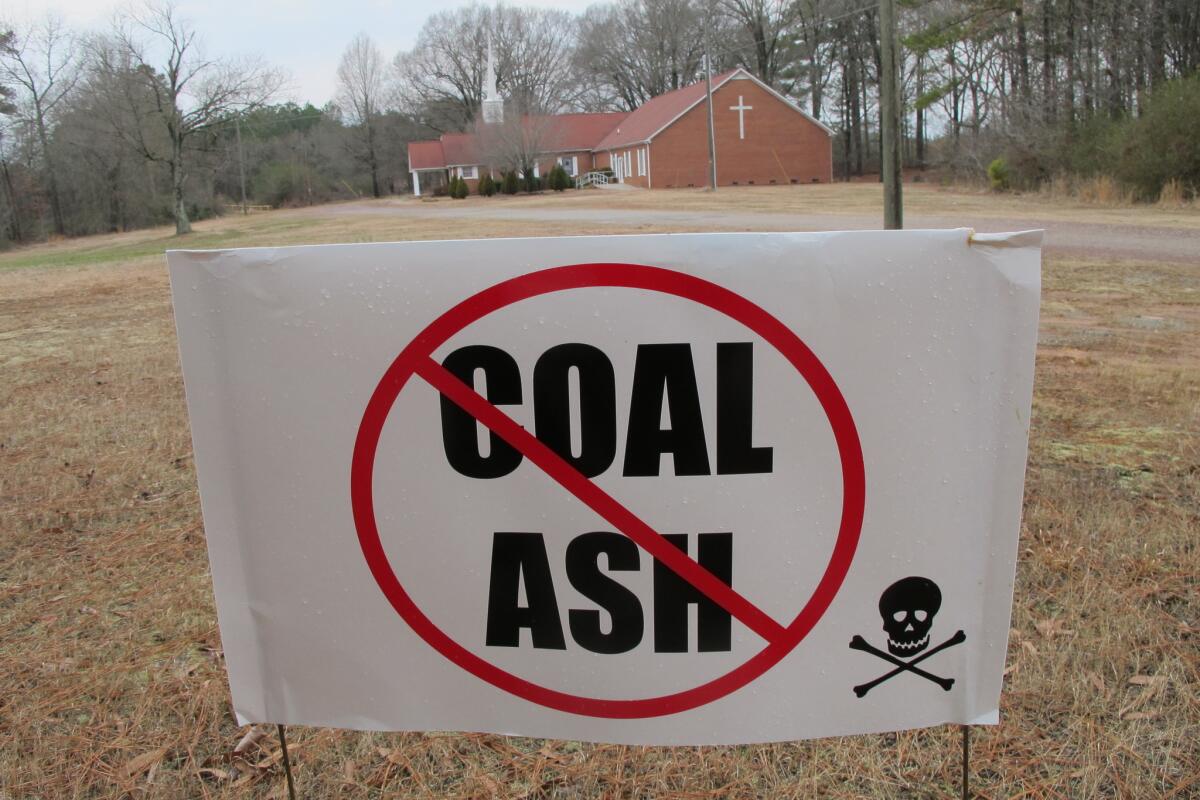Duke Energy setting aside $100 million to settle coal ash spill case

- Share via
Reporting from Durham, N.C. — Duke Energy announced Wednesday that it is setting aside $100 million to pay for a proposed settlement of a federal criminal investigation of the giant utility’s handling of coal ash in North Carolina.
In an earnings report, Duke said it intended to pay a penalty under a proposed agreement that would resolve the investigation, which began in February 2014 following a massive coal ash spill at a shuttered Duke power plant on the Dan River.
A federal grand jury in Raleigh has been investigating Duke’s handling of coal ash at several sites in North Carolina, including the Dan River location. The spill on Feb. 2, 2014, dumped up to 39,000 tons of coal ash and 27 million gallons of coal ash slurry into the Dan, coating the bottom and banks for 70 miles.
Known as “coal combustion residuals,” coal ash is the residue left after coal is burned to produce electricity. It is typically stored in unlined ponds or pits next to waterways. Coal ash slurry contains toxic arsenic, lead, mercury and heavy metals that can contaminate groundwater, streams and rivers while also polluting the air.
The company said it was in settlement negotiations with federal prosecutors “related to the ongoing federal grand jury investigation.” Duke said the $100-million figure represents “the company’s assessment of probable financial exposure related to any agreement.”
The earnings report added: “The company expects a proposed agreement could be reached and filed in the next several days for consideration by the court.”
Duke Chief Executive Lynn Good told reporters during a conference call: “We believe we are close to an agreement.”
Thomas G. Walker, the U.S. attorney for the Eastern District of North Carolina, declined to comment on Duke’s announcement or to say whether the grand jury investigation is continuing. Walker said last month that the investigation was ongoing.
The grand jury has investigated the relationship between Duke Energy and state environmental regulators, who have been accused by environmental groups of failing to adequately regulate Duke, the nation’s largest utility. Federal subpoenas issued to Duke and the state Department of Environment and Natural Resources requested records of any payments or “items of value.”
Walker last year described the federal probe as a “criminal investigation of a suspected felony.”
The state environmental agency said in a statement Wednesday that it is not part of negotiations over the federal investigation.
“This settlement would not resolve DENR’s civil litigation over violations at coal ash ponds, which is ongoing,” the agency said. “We also continue to investigate violations of state groundwater standards and to maintain our enforcement partnership with the U.S. Environmental Protection Agency for civil violations of the Clean Water Act.”
Duke Energy faces several lawsuits for its handling of coal ash at 32 storage sites at 14 power plants in North Carolina that contain 130 million tons of ash.
State regulators have filed suits against Duke that cite groundwater contamination at all 14 plants and illegal seeps from earthen dams surrounding the coal ash ponds, also called lagoons. In December, Duke reported about 200 seeps that released up to 3 million gallons a day from the ponds into nearby rivers and lakes.
Frank Holleman, senior attorney for the Southern Environmental Law Center, which represents groups that have sued Duke, said the utility “cannot pay its way out of the problem.” Duke’s executives “have an obligation to demonstrate that they regret what happened and that they are going to clean up their coal ash,” Holleman said.
The law center and other environmental groups have demanded that Duke transfer coal ash from all 14 locations to dry, lined pits away from waterways.
A Duke Energy proposal to transfer several million tons of coal ash to storage pits in abandoned clay mines in two rural North Carolina counties prompted angry protests last month from residents and county commissioners.
The EPA says it has documented 160 cases of air and water contamination from coal ash ponds nationally, with 140 million tons generated each year. Duke’s Dan River site near the border with Virginia had been converted from coal to natural gas, but coal ash remains stored in lagoons next to the river.
Twitter: @davidzucchino
More to Read
Sign up for Essential California
The most important California stories and recommendations in your inbox every morning.
You may occasionally receive promotional content from the Los Angeles Times.











